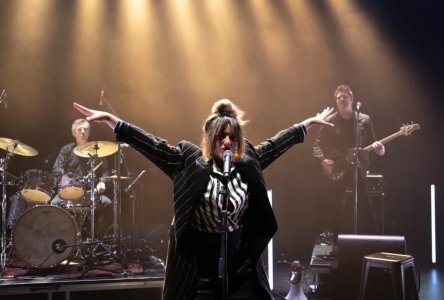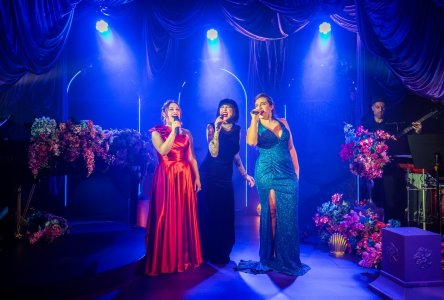
Blackbird
Blackbird, Wharf 1, Sydney theatre Company, December 21-February 16 2008
Blackbird is a bold and fascinating choice for Cate Blanchett's full-length, directorial debut. It's a difficult undertaking in every aspect: the subject matter, staging and eventual realisation of the text are fraught with complexity and there's plenty of room for disaster. Happily, her ambition and courage - so evident in her own acting work - are also obvious here and the result is two terrific performances from Paula Arundell and Peter Kowitz in an absorbing, disconcerting and ultimately satisfying 90-odd minutes of serious and seriously good theatre.
Blackbird, by Scottish playwright David Harrower, is his fifth play and most successful to date. It was first seen at the Edinburgh Festival in 2005 before transferring to the West End, picking up the Festival and Olivier awards for best new play along the way. Earlier in 2007 it was produced off-Broadway and in San Francisco, by which time Blanchett had already chosen and programmed it for Sydney.
The play is about sexual obsession, transgression, memory and expectations. In an informal photo of the director and her cast in rehearsal, a blackboard can be seen behind them bearing the chalked name "Sisyphus". You'd give a quid to know which one of trio hit upon the significance of the Greek mythological symbol of treachery and trickery (and pointless-tasks-as-punishment-for-same). If you care to ponder it, Sisyphus is significant to the play - although not the obvious. There is little that is obvious in either the play or the production.
Blackbird opens with the unwelcome arrival of a young woman, Una, at Ray's workplace. Ray is in middle management - or is that simply what he implies? It quickly becomes clear that his position at an undefined yet clearly seedy factory is anything but elevated. At the same time, Una is not all she initially appears to be either.
She has come looking for him 15 years after an affair - when she was 12 and he the classic "family friend" and 40. As a result he has spent six years in jail and - it could be argued - is still imprisoned by his past transgression. Yet so is Una who has come seeking closure, or so she says. When she rummages in her bag he grabs it in panic, believing she is going for a weapon. The joke that follows is one of an unexpected number of laughs in a dark night.
Like almost everything about the play and production, however, the darkness is neither stereotypical nor what one might anticipate. The writer looks at the relationship as it was and is with a dispassionate and curious eye; neither condemning nor condoning and refusing every easy answer. Indeed, he leaves answers - the black and white of a world of grey areas - to those in the audience brave foolish enough to throw stones.

Designer Ralph Myers and lighting designer Nick Schlieper have created an unusual and effective space in Wharf 1 by turning it into what feels alternately like a threatening bear-pit or an almost cosy sanctuary. The audience surrounds the stage area and looks down upon the two actors as they constantly circle, picking at burger wrappers, their ideas and memories of past and present and their expectations and desires for the future. It's a bleak place - the grubby, litter-strewn rec room of the factory - which says much about Ray's predicament as well as the mess the pair is still in.
Paula Arundell is an actor whose intelligence, sensuality and seemingly casual willingness to enter minefields of human relations is legendary. She rarely puts a foot wrong in anything she does and Blackbird is no exception. She sets her own standards and this performance is right up there with the best of them.
Peter Kowitz's long absence from the Sydney stage is all the more obvious now he's back in a performance of great depth, understanding and excruciating honesty. It can't be easy for a man to take on the depiction of one of the most consistently reviled facets of masculinity and he does it without resort to excuses or pleas for sympathy. (It's not enough to say, "but he's an actor", look at how Hollywood stars - and many actors - avoid such roles, or cop out of them, to realise the gutsiness of the undertaking.)
 In the end, as Una comes to grips with the reality of her quest, it's seedy, hopeful and hopeless Ray who lingers in the heart and mind. Along with the questions that hang in the gloom between them, there is a sense of tragedy past and present that is shocking for what it reveals about our own responses to their individual predicaments.
In the end, as Una comes to grips with the reality of her quest, it's seedy, hopeful and hopeless Ray who lingers in the heart and mind. Along with the questions that hang in the gloom between them, there is a sense of tragedy past and present that is shocking for what it reveals about our own responses to their individual predicaments.
Blanchett, Arundell and Kowitz bring the Sydney Theatre Company's rather tricky 2007 to a close in fine style. Blackbird is a reminder that less is more and courage, confidence and ambition may sometimes be rewarded.


-c444x300.jpeg)
